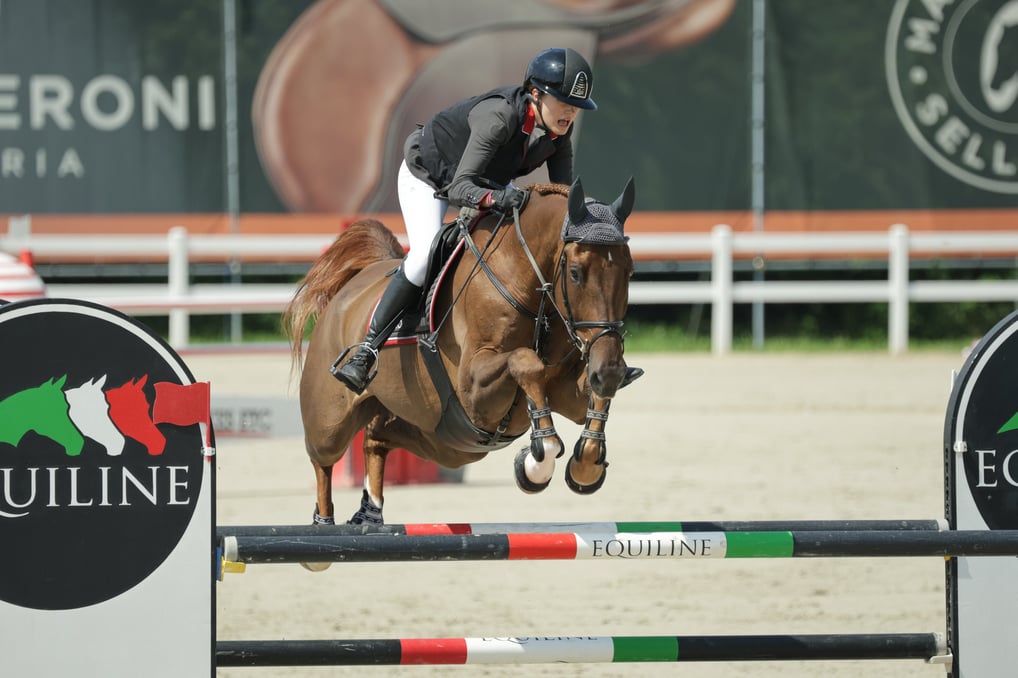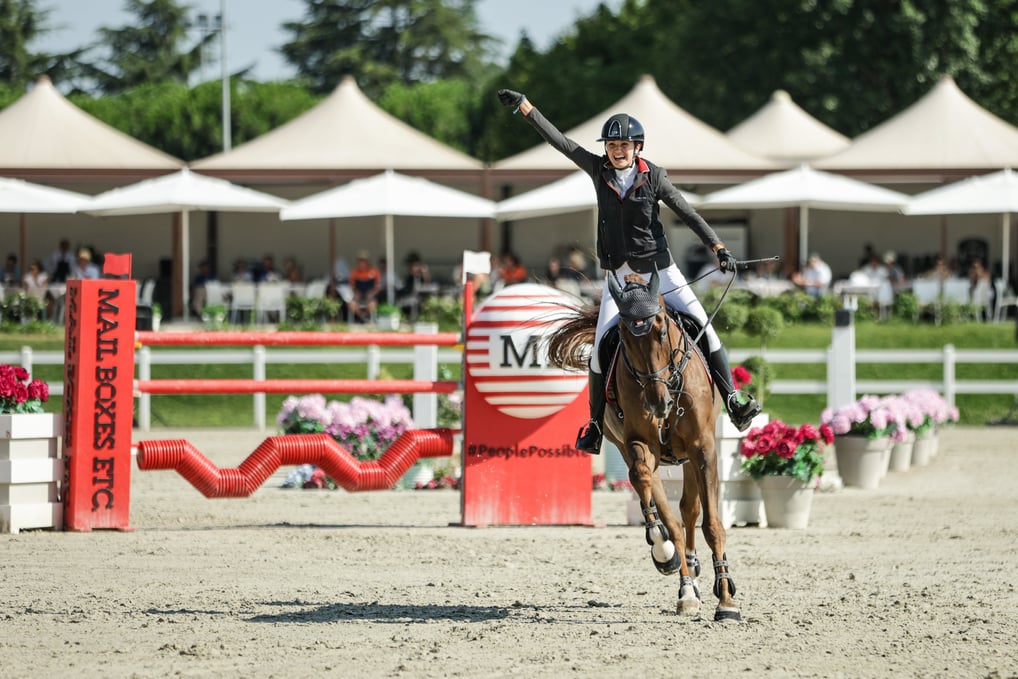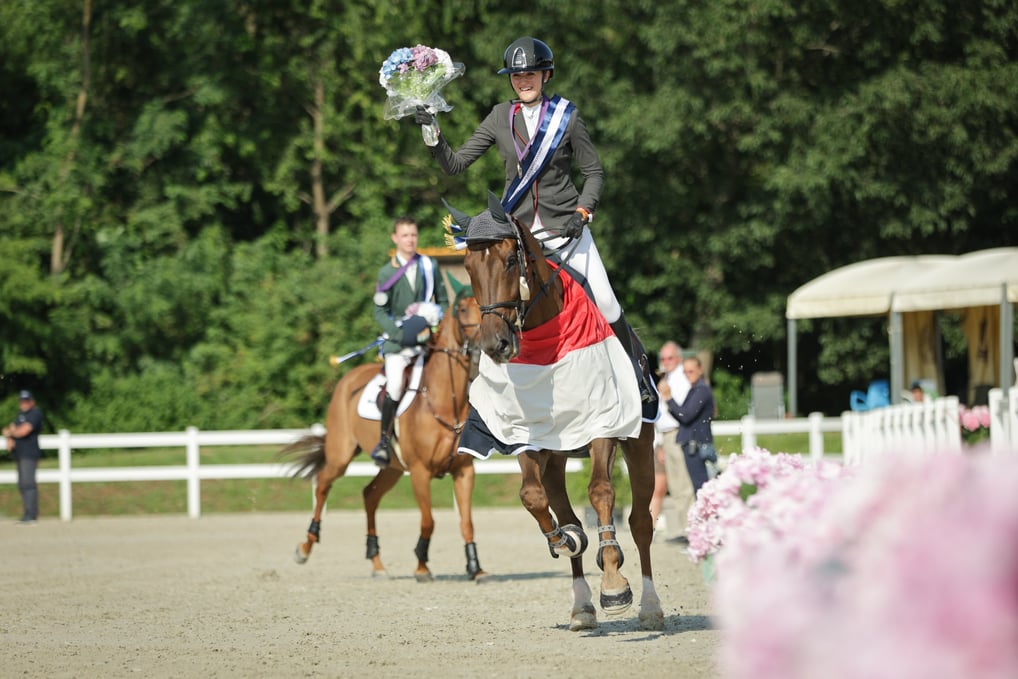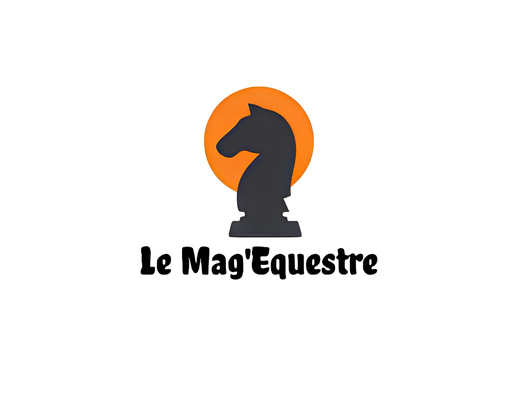Anastasia Nielsen
Can you introduce yourself in a few words and tell us about your equestrian evolution?
I am Anastasia Nielsen, 18 years old. When I look back at my equestrian journey, I am filled with pride for the growth I've achieved over the past few years. I am fortunate to have grown alongside a fantastic string of horses, and together we've achieved some outstanding results. For example, this year, I competed as a Junior in the Young Rider Europeans and finished in 4th place.
What are your goals for the end of the year, both overall and with each of your horses?
I can proudly say that I've already achieved some of the goals I set for myself, such as finishing the Young Riders European Championship on a high note and riding my first 3* Grand Prix. My main goal now is to continue growing until the end of the season at the 4* level and to compete in some bigger classes at 5* shows.
What is your greatest pride? And, on the contrary, your greatest disappointment?
Greatest pride to gain a solid partnership with a horse, it means more than the result itself sometimes, especially when the partnership took a lot of work to build up and it's finally consistent and solid Disappointment: when I first got to Wellington I felt a bit lost, it was a complete new surroundings, training and show concept for me and the initial results weren't what I was aiming for and most of my rounds didn't reflect the hard work that was behind them, that was quite disappointing for me at first, but I was fortunate enough to be surrounded by an amazing team that helped me get through the first couple of weeks and after that everything started going smoothly and the results started coming. Sometimes it can be very frustrating when things don't go as planned, for the team and for everyone working hard towards the results but having a supportive team and a good mindset helps you overcome these difficulties.
Did you expect to be crowned Gold Medalist at the European Championships?
It's definitely a result that my team and I worked hard towards. Going into a championship is always special, and no matter how hard you work, anything can happen over four days of competition. I am extremely grateful that everything went according to plan and that all of my strategies for each course worked out well. Sometimes, just half a second can lead to a mistake and cost you a medal. This win especially taught me to enjoy every single moment of the title without taking days like this for granted.
During the Jumping de Monaco, we had the chance to meet Anastasia Nielsen, the rising star of Monaco and the European Junior Champion in 2023.
Good reading


© FEI/Marta Fusetti
Which horse has made the most impact on your career? And which ones do you believe in the most?
It's a tough choice, as I'm fortunate to have had many great horses. If I had to choose three, it would definitely be Buffy, Castro and Contou. Buffy is the one who took me to my first bigger international shows and taught me so much about the sport and competitiveness. Castro is the one that gave me so much confidence, taking me from my first junior Championship to my first 5* shows.
Contou is the first horse who helped me achieve a championship title and reach my bigger goals. He's also the horse I chose for my first senior Nations Cup. I believe a lot in him, and we've built up a great partnership based on mutual trust.
You've recently acquired several 5-star Grand Prix horses, such as Bentley de Sury, Dark Chocolate 48, and Franco 78. Are you thinking about the 2025 European Championship?
The purchase of these horses was definitely made to help me grow as a rider with three very good and proven horses at the 5* level. What I love most about them is that they are each so different and teach me different things when I compete. There is still a lot I need to work on before reaching Senior championship level, but it is one of my biggest goals and dreams to participate in them in the future.
How do you manage your horses' competition schedules, and what care do you give them?
I am very fortunate to have a great team of grooms and a stable manager who make sure that all the horses get what they need. I personally try to spend as much time as possible in the stable, getting to know my horses by hand-walking and grazing them after I ride. This helps me build a solid partnership from the ground up. I truly believe that spending time with my horses creates a unique connection that helps build our bond when we go into the ring. The horses really fight for me and help me, and I love knowing them on both good days and bad days, as this helps me ride them better.
The Monegasque Federation has Philippe Rozier as a coach. What has he taught you?
I think I can speak on behalf of my team members also, Philippe has taught all of us, how to have a good team spirit and how to fight for the team and our Nation, to keep a cool mind when it gets tough and to always keep our eyes on the goals, Monaco is a very small federation, so we don't have that many people traveling to the shows that represent Monaco, so it means even more when we achieve something special.
Have you recently integrated Cian O'Connor into your staff as a coach? What does he bring to your daily life?
Training with Cian O'Connor has not only made me a better rider but has also given me a deeper understanding and knowledge at a 360-degree level—how to manage sport horses and how to have the mindset of a proper athlete.


© FEI/Marta Fusetti
Do you think a horse without top genetics can compete at a high level?
I think genetics is a big plus, but it doesn't always mean everything. There are horses that have achieved big things without having a particularly well-known pedigree.
There are many debates about the changes made by the FEI. What is your opinion about these changes, particularly the three-rider format with the Jump-Off and the League of Nations?
The three-rider format with no drop score makes the competition more exciting for the public, as anything can happen and change quickly. However, in some extreme cases, if a horse doesn't feel fit over the course or if a rider feels something is wrong, they can't just stop and retire because it would put the whole team at a disadvantage. Equestrian sports are very different from other Olympic disciplines, so adapting this format from other sports is challenging, especially since we compete with another living being.
How would you describe riding to the public? Can you explain why riding is a sport?
I think anyone who loves animals and sits on a horse for the first time falls in love. Horses are the best life companions; they are incredibly sensitive and truly understand your emotions. Riding is a sport because it requires physical effort. The higher the level, the fitter the rider needs to be. I personally choose to stay fit through gym workouts focused on functional and stability training. Balance is something you can improve, and to be a good rider, having good balance really helps.
This year, you became a member of the Iron Dames, a team competing in the Global Champions Tour. Do the other riders treat you in a friendly or professional manner?
I am very honored to be part of the Iron Dames. They are all great women whom I admire both in life and in the sport. I'm also proud to represent the first equestrian concept featuring an all-women's team, which sends a beautiful and powerful message that I'm very happy to be part of. Unfortunately, I haven't had the chance to spend much time with each team member yet, but whenever we do see each other, we have a lot of fun. I really appreciate Deborah Mayer's effort in creating a team bond by organizing activities outside of the competition grounds.
Readers' Questions:
How do you find exercises for your horses?
I mostly trust my trainer to choose the right exercises for my horses. I have great respect for his professionalism, and he can see things from the ground that I can't. Understanding the needs of each horse and adapting exercises accordingly is very important. Therefore, I'm happy to develop a good plan with him based on both my feelings and his perspective.


© FEI/Marta Fusetti
Do you think that equine ethology and well-being are sufficiently considered in the equestrian environment?
There is a growing awareness and emphasis on equine ethology and well-being in the equestrian community, but opinions on whether they are sufficiently addressed can vary. Many professionals and organizations are actively working to incorporate these principles into their training and care practices. However, there is always room for improvement, and continued efforts are needed to ensure that the well-being of horses remains a top priority across all levels of the sport.
What is the place of ethology and equine well-being in high-level sport?
Ethology and equine well-being are increasingly recognized as important aspects of high-level sport. Understanding a horse's natural behavior and ensuring its physical and mental well-being are crucial for achieving optimal performance. While the demands of competitive sport can be intense, integrating principles of ethology helps in creating a training environment that respects the horse's nature, leading to a more harmonious and effective partnership between horse and rider.
